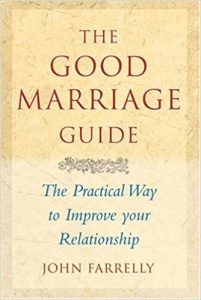The Good Marriage Guide
 “The key to developing a successful marriage” is found in “personal change and growth,” John Farrelly says in The Good Marriage Guide. The author is director of counseling for ACCORD, the nationwide marriage care service of the Catholic Church in Ireland.
“The key to developing a successful marriage” is found in “personal change and growth,” John Farrelly says in The Good Marriage Guide. The author is director of counseling for ACCORD, the nationwide marriage care service of the Catholic Church in Ireland.
Farrelly presents his 94-page book as “a compact, concise and informative guide for couples who want to save or strengthen their marriage and relationship.” The book is designed to offer couples “knowledge and skills” for taking control of their lives, he writes.
“Couples who stay together do what is necessary to make the marriage a happy one. They find out what brings their partner happiness and then do it often,” Farrelly observes.
These couples, he continues, “realize that not all times will be good and gain an insight into the everyday obvious pressures and also the psychological structures to ensure that the love that brought them together is strengthened over the lifetime of their marriage.”
The book’s seven chapters examine the challenges married couples may encounter when it comes to communicating effectively, handling conflict, balancing work with home life, dealing with infidelity, assuring that time spent on the Internet does not “eat into the marital space” in harmful ways and handling the arrival of children.
It might not seem that the birth of a couple’s first child would pose any threat to their marriage, and Farrelly indicates that for some 60 percent of couples it does not. That leaves another 40 percent, however. Farrelly writes:
“The greatest story never told is how hard it is to come to terms with the challenges of parenting while maintaining a healthy relationship. … The psychological move from being somebody’s son or daughter to being a father or mother has to be negotiated effectively by both partners.”
Farrelly advises new parents to remember they have two roles. “You are both a mother and a wife or a father and a husband. You must make a pact that you will not stop being friends and lovers just because you are mums and dads.”
New parents “need to renegotiate” their relationship, Farrelly believes. He urges them: “Make a plan. Set a division of labor and time, and make a commitment to having fun and recreation in your life.”
I found Farrelly’s chapter on the relationship a married couple has with the spouse’s families of origin of considerable interest, especially since it imparts some fairly obvious — and important — insights in a down-to-earth manner not often heard. When it comes to repeating sometimes negative patterns of life learned in their families of origin, Farrelly says:
“Remember that you are not your parents! Sure, you share many of the same strengths and weaknesses, but you have the power to make different decisions. … If you don’t want to repeat the mistakes of your parents, learn from them!”
The author’s analysis of family-of-origin issues is insightful throughout. Let me single-out two other comments he makes:
“Part of what it means to have your own identity as a couple is that conflicts are resolved without the involvement of in-laws.”
“Respect your mother-in-law and father-in law. Remember, they are the parents of someone very special – your spouse. If you are a parent of a married child, your son-in-law or daughter-in-law is very special because they are your child’s life partner. That said, it is best for each family to realize the independence of the other.”
For me, Farrelly’s discussion of communication was his book’s most compelling chapter. He distinguishes clear from vague communication, open from guarded and honest from dishonest, and concludes, “Simply put, there are two ways to communicate with others; effectively and ineffectively.”
For Farrelly, effective communication is direct and to the point; assertive – that is, “not afraid to state what is wanted or why”; congenial; clear; open, with “no intentionally hidden messages or meanings”; verbal – that is, “words are used to clearly express ideas”; two-way, with “equal amounts of talking and listening.”
In addition, effective communication is responsive, meaning attention is paid “to the needs and perspective of the other person”; on track, meaning it “correctly interprets responses and needs of the other person; and honest, meaning that “true feelings, thoughts and needs are stated.”
It takes “considerable practice” to become able to articulate thoughts and to be “certain that your spouse understands what you wish to say,” Farrelly writes. However, he states, “communication and relationships are inseparable; you cannot have a relationship with someone” without communicating with that person.
About the reviewer
David Gibson served for more than 37 years on the Catholic News Service editorial staff.
Disclaimer: Book reviews do not imply and are not to be used as official endorsement by the USCCB of the work or those associated with the work. Book reviews are solely intended as a resource regarding publications that might be of interest to For Your Marriage visitors.




